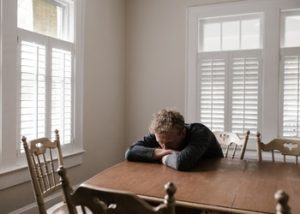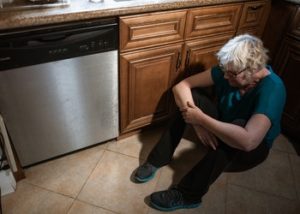How Do I Know If I Have Depression?
How Do I Know If I Have Depression?
“Everyday is a second chance.”
— Anonymous
 Have you ever had days when you hated the thought of waking up in the morning? Maybe you’ve been struck by a feeling of apathy and felt as if all your efforts would never pay off in the long run. So why bother putting in the effort at all? Some people don’t even want to start their days because then they’ll be expected to finish it.
Have you ever had days when you hated the thought of waking up in the morning? Maybe you’ve been struck by a feeling of apathy and felt as if all your efforts would never pay off in the long run. So why bother putting in the effort at all? Some people don’t even want to start their days because then they’ll be expected to finish it.
This is what depression can look like.
Depression affects more than 264 million people the world over and carries a lot of misconceptions and social stigma around it. After reading this article, you’ll be able to tell if you or someone you know might be experiencing clinical depression that deserves medical intervention. Or if they’re simply feeling low and sad instead.
The Silent Killer
There are plenty of people with clinical depression that don’t seek out treatment because of how they might be perceived. On the other hand, there are people walking around with self-diagnosed depression that could be misleading everyone on what actual depression looks like and contribute to the social stigma instead.
Ignoring symptoms of depression can give rise to other serious illnesses such as diabetes, cancer, heart disease, or chronic, debilitating pain. Depression is manageable and may be treated with the medical intervention or therapy.
How Do I Know If I Have Depression?
Everyone feels sadness. It’s a completely normal human emotion. There are common triggers in life that lead to a condition known as situational depression, which most confuse with serious, major depression instead.
 Situational depression can be triggered by a host of events such as –
Situational depression can be triggered by a host of events such as –
- Job loss
- A breakup
- The death of a loved one
- A serious accident
- Major life changes
- A toxic love life or toxic work-life
Situational depression is a perfectly normal response to a traumatic event that is short-term and often resolves itself without any medical intervention.
If you have situational depression, you might have –
- Feelings of hopelessness
- Inability to concentrate
- Frequent crying episodes
- Restlessness
- Anxiety
- Withdrawal from normal activities
Clinical depression is a much more serious form of situational depression. It’s formally known as major depressive disorder, and it can be severe enough to affect your day-to-day routine.
The Diagnostic and Statistic Manual of Mental Health Disorders (DSM-V) speculates that major depressive disorder might be caused by genetic factors and substance abuse. Or possibly even due to issues with your neurotransmitters.
 Clinical depression can carry much more severe symptoms such as :
Clinical depression can carry much more severe symptoms such as :
- Significant weight loss or weight gain
- Significant increase or decrease in appetite
- Being unable to make simple decisions
- Constant irritability
- Thoughts of suicide to end the pain
- Hallucinations
- Manic episodes
- Chronic pain
And depression doesn’t look the same for everyone, either.
Children might become cranky, anxious, refuse to go to school, or cling to a parent. They might worry about one of their parents dying and how they would cope after that. Teenagers might get into problems at school, have low self-esteem, get easily frustrated or develop eating disorders. Women, in particular, are especially susceptible to depression because of the biological life cycle and hormonal factors unique to them. Middle-aged adults experience the loss of libido, night-time awakenings, and digestive issues that don’t seem to go away. Older adults might report a total lack of emotions and feeling numb rather than anger or irritability. They’re also more likely to have medical conditions that might contribute to their depression. In severe cases of depression, you will be able to notice memory loss, which resembles a form of pseudo-dementia.
If you’ve been battling depression for a while, you might have adopted unhealthy coping mechanisms as well. Drinking, smoking, and drugs might have helped you power through the pain just so you can live your day-to-day life. These can cause health issues that your doctor might notice before your depression and lead to misdiagnoses as well.
How Can I Get Treated?
 Talk with your health care provider. There are effective medical treatments that help with the symptoms and can tackle the root problem as well. Psychological treatments such as cognitive behavioral therapy or interpersonal psychotherapy are scientifically proven to provide relief.
Talk with your health care provider. There are effective medical treatments that help with the symptoms and can tackle the root problem as well. Psychological treatments such as cognitive behavioral therapy or interpersonal psychotherapy are scientifically proven to provide relief.
If your condition is severe, a professional might prescribe antidepressant medications such as selective serotonin reuptake inhibitors or tricyclic antidepressants. Psycho-social treatments and face-to-face therapy are highly recommended. While antidepressants are safe and effective, they must never be the first line of treatment for children and teenagers, for whom alternative treatments should be considered.
If you or someone you know is feeling symptoms of depression, you Kaiser Permanente Insurance may cover your therapy sessions. Our facilities in Denver, Aurora, and Arvada are open Monday through Friday, 8:30 a.m. to 5:00 p.m. Browse through therapist profiles to find a therapist who meets your needs.
